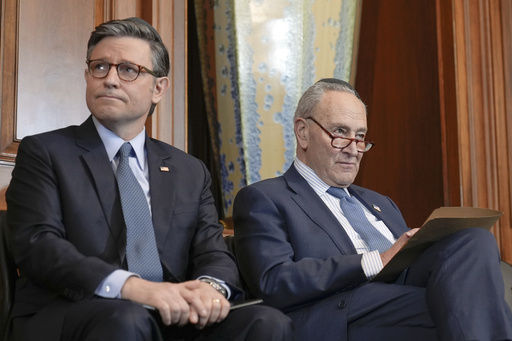Washington — In a surprising move, President-elect Donald Trump rejected a bipartisan effort on Wednesday aimed at averting a potential government shutdown during the holiday season. He directed House Speaker Mike Johnson and the Republican contingent to renegotiate terms just days before the federal funding deadline.
Trump’s abrupt retraction of support complicated matters for lawmakers, who were racing against time to finalize legislative work before heading home for Christmas. With only days left until the deadline, Johnson found himself struggling to create a new strategy to ensure government operations continue without interruption.
In a shared statement with Vice President-elect JD Vance, Trump urged Republicans to be shrewd and assertive in their negotiations. His proposals included an extension for government funding, along with a contentious demand to raise the national debt limit — a move often rejected by his own party.
Democrats were quick to criticize the internal conflict within the GOP regarding the temporary funding measure. House Democratic Leader Hakeem Jeffries remarked that with Republicans essentially directed to respond with a government shutdown, they were poised to harm the working-class Americans they claim to advocate for. “If you undermine the bipartisan agreement, you must accept the responsibility for the fallout,” he stated.
The bill was already facing significant opposition. Right-leaning conservatives, along with Trump’s billionaire supporter Elon Musk, expressed their discontent with the bloated 1,500-page measure, particularly over its spending increase and provisions including long-overdue salary raises for members of Congress. As several Republicans looked to Trump for guidance on how to vote, Musk voiced his disapproval on social media, insisting, “This should not pass.”
House Speaker Johnson, echoing the challenges faced by previous Republican leaders, has struggled to unite various factions within his party around essential government operations, which many wish to scale back. Not even substantial disaster relief funding for areas affected by hurricanes earlier this year, nor aid for farmers, managed to sway budget-conscious Republicans.
This situation is emblematic of the challenges that the GOP will face in the upcoming year as they gain control over the House, Senate, and the presidency. It also highlights Johnson’s reliance on Trump’s endorsement to push any legislative effort through. Senator Mitt Romney commented on the confusion, questioning what Republicans are expected to do without clear direction from Trump.
While Trump remained largely silent on the matter, Musk, who is now at the helm of a new efficiency initiative, called out members of Congress who choose to support the spending bill, warning they risk losing their seats in upcoming elections. His remarks carry weight given his significant influence and financial backing in political circles.
Democratic Representative Jamie Raskin of Maryland raised concerns about the power held by a small group of wealthy individuals, describing it as an oligarchy and emphasizing the coercive influence they wield. As Democrats collaborated with Johnson and Senate Republicans to finalize the bill, they likely will need to provide enough votes for passage, a common practice for larger legislative measures.
Senate Majority Leader Chuck Schumer underscored the urgency, stating, “The sooner Congress acts, the better,” and reinforced the necessity of bipartisan collaboration to avoid delays. The proposed stopgap measure intends to maintain government functions at their current levels until March 14, 2025.
Due to Congress’s inability to pass annual appropriations for various federal agencies by the close of the fiscal year on September 30, a temporary funding solution was put in place that is set to expire soon. The lengthy funding bill includes additional provisions that lawmakers hope to pass before the looming congressional session ends.
Representative Anna Paulina Luna criticized the bill’s contents harshly, while Freedom Caucus Chairman Rep. Andy Harris expressed disappointment over the week’s developments. The issue of pay raises drew attention as lawmakers feared the proposal might lift a pay freeze, potentially allowing for a 3.8% increase in offers moving forward, which many found inappropriate given the context of recent years.
The package allocates funds for significant infrastructure projects, including the reconstruction of the Francis Scott Key Bridge in Baltimore, which suffered damage due to a maritime accident. Additionally, measures to transfer federal land, previously housing the RFK Stadium, to local authorities were included, hinting at prospects for a new facility for the Washington Commanders.
On healthcare, the legislation aims to extend telehealth accessibility for Medicare recipients and regulate profits accrued by pharmacy benefits managers involved in insurance plan negotiations. Furthermore, the bill includes measures targeting China’s technological advancements, expanding on President Biden’s executive actions designed to limit investments in nations seen as security risks to the U.S., a bipartisan focal point of agreement.


